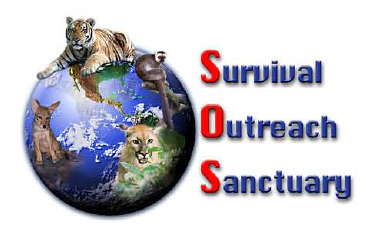Article Dated: Wednesday, February 14, 2001
Published: Post and Courier by Ann Burger,
Charleston, S.C.
Any cat fancier who’s watched the big-cat shows on the nature channel has noticed the resemblance between the leopard stalking a wildebeest on the Serengeti plain and the kitten stalking a bug on the kitchen floor. Most people know that the similarities, while striking, end where the
TV screen does. But there are those who conclude that a leopard is merely a
bigger, more exotic version of a house cat and decide to buy a little one to raise for themselves. How very wrong they are – wrong enough
to have kept Judy Watson busy for the past 17 years. That’s how long Watson has worked at rehabilitation facilities for exotic animals. Last September, she took the step from being a volunteer to being top cat – she founded the Survival Outreach Sanctuary, a nonprofit, nobreeding
sanctuary in Spring Hill, Fl. Watson will be one of the conservation
exhibitors at the college of Charleston’s Lightsey Conference Center during this weekend’s Southeastern Wildlife Expo. She’ll have with her a cougar named Jayla, a serval named Rudy, a whitefaced brown lemur named Bosco and an African Hedgehog named Homer. Watson says the cougar is her ambassador representing the endangered Florida panther – one of her special causes. The Survival Outreach Sanctuary cares for all kinds of exotic wildlife that people have given up on because the animals turned out to be more – much more – than they bargained for. “People think they’re going to make pets of them like they would a cat or a dog, but they have no clue what it takes to raise these animals,” she says. “They don’t lose their predatory instincts as they get older. Often people are looking to
get rid of them when they’re six months old.” The goal of the sanctuary is to
rehabilitate the animals and release them back into the wild – and to educate people about them. Education starts early, with the sanctuary
spending much time offering programs for school children. “Our main goal is to be sure people learn that these animals are not meant to be pets,” she says. The cats Watson will bring to Charleston are not “pettable.” She says
allowing people to touch them would contradict her message that these
animals are best appreciated at a little more distance. While people can’t
touch them, simply seeing them is enough to forge a bond, she says.
“With the animals, we can get people’s attention and make the dangers that
they face more personal for people,” she says. Also, people end up standing
around looking at these beautiful animals, and then they start talking to
us about them. “That’s how attitudes change.”
